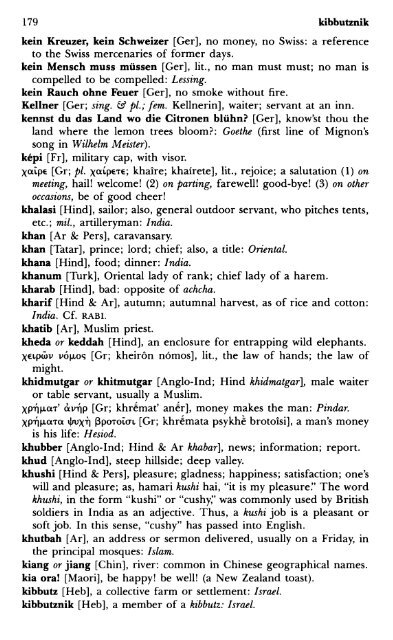- Page 1 and 2:
THIRD EDITION 15,000 words and phra
- Page 3:
The Harper Dictionary of Foreign Te
- Page 6 and 7:
A hardcover edition of this title i
- Page 9:
Contents Preface ix Acknowledgments
- Page 12 and 13:
Preface dictionaries, which usually
- Page 14 and 15:
Preface xii • Terms from language
- Page 17 and 18:
Abbreviations Used in This Book abb
- Page 19 and 20:
XVll mil. mod. myth. n. naut. nav.
- Page 21:
The Harper Dictionary of Foreign Te
- Page 24 and 25:
abiit ad plures 2 abut ad plures (o
- Page 26 and 27:
abusus non tollit usum 4 abusus non
- Page 28 and 29:
actum agere 6 actum agere [L], to d
- Page 30 and 31:
a Dios gracias 8 a Dios gracias [Sp
- Page 32 and 33:
affaire 10 affaire [Fr], affair; co
- Page 34 and 35:
aiguille 12 aiguille [Fr], needle;
- Page 36 and 37:
alea iacta est 14 alea iacta est [L
- Page 38 and 39:
almendra 16 almendra [Sp], almond.
- Page 40 and 41:
amigo 18 amigo [Sp; fern, amiga], f
- Page 42 and 43:
animis opibusque parati 20 animis o
- Page 44 and 45:
aperçu 22 aperçu [Fr], rapid view
- Page 46 and 47:
aquila non capit muscas 24 aquila n
- Page 48 and 49:
arrêtez! 26 arrêtez! [Fr], stop!
- Page 50 and 51:
à tort ou à raison 28 à tort ou
- Page 52 and 53:
au plaisir de vous revoir 30 au pla
- Page 54 and 55:
ave! 32 ave! [L], hail! —ave atqu
- Page 56 and 57:
Β baas [Afrik], master; boss: Sout
- Page 58 and 59:
anderilla 36 banderilla [Sp], a sma
- Page 60 and 61:
attue 38 strike a light. —battre
- Page 62 and 63:
elle amie 40 belle amie [Fr], femal
- Page 64 and 65:
ête 42 bête [Fr], η. beast; brut
- Page 66 and 67:
lague 44 blague [Fr], orig., tobacc
- Page 68 and 69:
onheur 46 bonheur [Fr], happiness;
- Page 70 and 71:
oulette 48 boulette [Fr], a small b
- Page 72 and 73:
ochet 50 brochet [Fr], pike (fish).
- Page 74 and 75:
e cabaletta [It], a short catchy me
- Page 76 and 77:
ça ira 54 ça ira [Fr], lit., it w
- Page 78 and 79:
candor dat viribus alas 56 candor d
- Page 80 and 81:
cárcel 58 cárcel [Sp], prison; ja
- Page 82 and 83:
cautionnement 60 cautionnement [Fr]
- Page 84 and 85:
cessez le feu! 62 cessez le feu! [F
- Page 86 and 87:
chaparajos 64 chaparajos or chapare
- Page 88 and 89:
chee-chee 66 chee-chee or chi-chi [
- Page 90 and 91:
chi parla troppo non può parlar se
- Page 92 and 93:
claque 70 claque [Fr], a body of hi
- Page 94 and 95:
comitas inter gentes 72 comitas int
- Page 96 and 97:
condamné 74 condamné [Fr; fern, c
- Page 98 and 99:
conto 76 conto [Pg], lit., a millio
- Page 100 and 101:
corregimiento 78 corregimiento [Sp]
- Page 102 and 103:
crains Dieu tant que tu vivras 80 c
- Page 104 and 105:
cuadrilla 82 doctors. —crux mihi
- Page 106 and 107:
cushy 84 cushy or kushi [Hind khûs
- Page 108 and 109:
dame du palais 86 dame du palais [F
- Page 110 and 111:
de bon augure 88 de bon augure [Fr]
- Page 112 and 113:
de gratia 90 de gratia [L], by favo
- Page 114 and 115:
dénouement 92 dénouement [Fr], th
- Page 116 and 117:
desierto 94 desierto [Sp], desert;
- Page 118 and 119:
Dhia duit 96 Dhia duit [Gael], good
- Page 120 and 121:
di giovinezza il bel purpureo lume
- Page 122 and 123:
d'occasion 100 d'occasion [Fr], acc
- Page 124 and 125:
doublure 102 doublure [Fr], ornamen
- Page 126 and 127:
dum loquimur fugerit in vida aetas
- Page 128 and 129:
e contra 106 1648. —école milita
- Page 130 and 131:
ejido 108 ejido [Sp], a common, or
- Page 132 and 133:
en arrière 110 en arrière [Fr], i
- Page 134 and 135:
ε ν ο ί ν ω α λ ή θ ε ι
- Page 136 and 137:
en vélin 114 en vélin [Fr], in ve
- Page 138 and 139:
escroquerie 116 escroquerie [Fr], d
- Page 140 and 141:
et campos ubi Troia fuit et campos
- Page 142 and 143:
ex animo 120 ex animo [L], from the
- Page 144 and 145:
ex propriis 122 ex propriis [L], fr
- Page 146 and 147:
faïence 124 faïence [Fr], glazed
- Page 148 and 149:
farandole 126 farandole [Fr], a rap
- Page 150 and 151: fermage 128 fermage [Fr], the farmi
- Page 152 and 153: fiesta 130 fiesta [Sp], religious f
- Page 154 and 155: floración 132 floración [Sp], out
- Page 156 and 157: fourgon 134 fourgon [Fr], baggage o
- Page 158 and 159: Frühlingslied 136 Frühlingslied [
- Page 160 and 161: G gaddi [Hind], cushion; throne. Se
- Page 162 and 163: Gebirg 140 Gebirg [Ger; pl. Gebirge
- Page 164 and 165: gharry 142 gharry or gari [Anglo-In
- Page 166 and 167: gospodin 144 gospodin [Russ; fern,
- Page 168 and 169: greffier 146 greffier [Fr], registr
- Page 170 and 171: H haba [Sp], bean; esp., lima bean.
- Page 172 and 173: hardiesse 150 hardiesse [Fr], hardi
- Page 174 and 175: Herr 152 Herr [Ger; pl. Herren], lo
- Page 176 and 177: hoc volo, sic iubeo, sit pro ration
- Page 178 and 179: δ συν ό θεός συνέζε
- Page 180 and 181: huurder 158 huurder [Du], a lessee:
- Page 182 and 183: ignis aurum probat, miseria fortes
- Page 184 and 185: il se recule pour mieux sauter 162
- Page 186 and 187: Incarnatus 164 Incarnatus [L], a pa
- Page 188 and 189: ingenio sin prudencia, loco con esp
- Page 190 and 191: in rerum natura 168 a ship or cargo
- Page 192 and 193: invita Minerva 170 invita Minerva [
- Page 194 and 195: iustítia omnibus 172 iustítia omn
- Page 196 and 197: jeder fege vor seine Tür 174 jeder
- Page 198 and 199: juego 176 juego [Sp], game. juego d
- Page 202 and 203: kibei 180 kibei [Jap], lit., return
- Page 204 and 205: Kunst 182 Kunst [Ger; pl. Künste],
- Page 206 and 207: la cruz en los pechos y el diablo e
- Page 208 and 209: la patience est amère, mais son fr
- Page 210 and 211: le bonheur semble fait pour être p
- Page 212 and 213: tentando 190l lentando [It], becomi
- Page 214 and 215: libro cerrado no saca letrado 192 l
- Page 216 and 217: lo dicho dicho 194 lo dicho dicho [
- Page 218 and 219: Luxuszug 196 Luxuszug [Ger], first-
- Page 220 and 221: magistrates indicat virum 198 magis
- Page 222 and 223: male parta male dilabuntur 200 male
- Page 224 and 225: manage 202 manage [Fr], marriage.
- Page 226 and 227: médaille 204 médaille [Fr], medal
- Page 228 and 229: méprisable 206 méprisable [Fr], c
- Page 230 and 231: misce stultitiam consiliis brevem 2
- Page 232 and 233: montagnard 210 montagnard [Fr; fern
- Page 234 and 235: moulin 212 moulin [Fr], mill; speci
- Page 236 and 237: mutum est pictura poema 214 mutum e
- Page 238 and 239: natura il fece, e poi roppe la stam
- Page 240 and 241: nemo mortalium omnibus horis sapit
- Page 242 and 243: nil consuetudine maius 220 nil cons
- Page 244 and 245: nomina stultorum parietibus haerent
- Page 246 and 247: non sequitur 224 non sequitur [L],
- Page 248 and 249: nullius addictus turare in verba ma
- Page 250 and 251:
odi profanimi vulgus et arceo 228 o
- Page 252 and 253:
omnia tuta timens 230 omnia tuta ti
- Page 254 and 255:
ore rotundo 232 ore rotundo [L], li
- Page 256 and 257:
Ρ pabulum Acheruntis [L], food for
- Page 258 and 259:
papetier 236 papetier [Fr; fern, pa
- Page 260 and 261:
partage 238 partage [Fr], share; po
- Page 262 and 263:
pathma 240 pathma [Beng], lotus flo
- Page 264 and 265:
per aspera ad astra 242 per aspera
- Page 266 and 267:
petit-bleu 244 fop; dandy; coxcomb;
- Page 268 and 269:
pishu 246 pishu [Can Fr pichou], th
- Page 270 and 271:
polisson 248 polisson [Fr; fern, po
- Page 272 and 273:
potage 250 potage [Fr], soup. —po
- Page 274 and 275:
pré-salé 252 pré-salé [Fr; pi.
- Page 276 and 277:
proletaree fsyoch stran, soyadinyat
- Page 278 and 279:
pulque 256 pulque [Mex Sp], a Mexic
- Page 280 and 281:
quare impedit 258 -—quantum valeb
- Page 282 and 283:
quid sit futurum eras, fuge quaerer
- Page 284 and 285:
quorum pars magna fui 262 quorum pa
- Page 286 and 287:
allentando 264 rallentando [It], sl
- Page 288 and 289:
edivivus 266 redi vi vus [L], resto
- Page 290 and 291:
epartimiento 268 repartimiento [Sp]
- Page 292 and 293:
idiculus mus 270 ridiculus mus [L],
- Page 294 and 295:
oti 272 roti [Hind], bread: India.
- Page 296 and 297:
sahih salamat 274 sahih salamat [Hi
- Page 298 and 299:
sánete et sapienter 276 "Miss Togo
- Page 300 and 301:
saumon 278 saumon [Fr], salmon. sau
- Page 302 and 303:
scordato 280 scordato [It], put out
- Page 304 and 305:
sempre 282 sempre [It], always; con
- Page 306 and 307:
sgraffito 284 sgraffito [It; pi. sg
- Page 308 and 309:
signor dell' altissimo canto 286 si
- Page 310 and 311:
soavemente 288 soavemente [It], swe
- Page 312 and 313:
soutache 290 soutache [Fr], a kind
- Page 314 and 315:
strada 292 strada [It], street. str
- Page 316 and 317:
suisse 294 suisse [Fr; fern. Suisse
- Page 318 and 319:
τ tabac or tabac à fumer [Fr], to
- Page 320 and 321:
τα σύκα σύκα, την σκ
- Page 322 and 323:
terrine de foie gras 300 terrine de
- Page 324 and 325:
toccata 302 toccata [It], a brillia
- Page 326 and 327:
tournure 304 tournure [Fr], contour
- Page 328 and 329:
triage 306 triage [Fr], sorting; si
- Page 330 and 331:
υ ua mau ke ea o ka aína i ka pon
- Page 332 and 333:
une araignée dans le plafond 310 u
- Page 334 and 335:
uti possidetis 312 uti possidetis [
- Page 336 and 337:
vareuse 314 vareuse [Fr], a pea jac
- Page 338 and 339:
Verein 316 Verein [Ger], associatio
- Page 340 and 341:
vierhändig 318 vierhändig [Ger],
- Page 342 and 343:
virtutis fortuna comes 320 virtutis
- Page 344 and 345:
volture 322 volture [Fr], carriage;
- Page 346 and 347:
voyelle 324 voyelle [Fr], vowel. vo
- Page 348 and 349:
Weltpolitik 326 Weltpolitik [Ger],
- Page 350 and 351:
ζ zacate [Sp], grass grown for for
- Page 352 and 353:
zweitens 330 Wildnis or, as it was
- Page 354 and 355:
actual 332 actual: actus; de facto;
- Page 356 and 357:
appetite 334 vermiform ~: appendix
- Page 358 and 359:
anquet 336 banquet: bara banterer:
- Page 360 and 361:
loodthirsty 338 cold ~: à froid; s
- Page 362 and 363:
utcher, pork 340 everybody's ~, nob
- Page 364 and 365:
channel, sluggish 342 channel, slug
- Page 366 and 367:
comfort 344 comfort: gemach comical
- Page 368 and 369:
corn on the foot 346 corn on the fo
- Page 370 and 371:
dagger 348 dagger: katar daily: per
- Page 372 and 373:
delegate 350 without ~: sine delega
- Page 374 and 375:
double 352 office of the ~ : concie
- Page 376 and 377:
employee 354 employee: empleado emu
- Page 378 and 379:
exposed 356 long ~: megillah expose
- Page 380 and 381:
feasting 358 feasting: bombance; ri
- Page 382 and 383:
fooleries, no more of these 360 not
- Page 384 and 385:
gaiety 362 for the ~: in futuro tho
- Page 386 and 387:
goddess 364 ~ pays: Bóg ~ preserve
- Page 388 and 389:
growling, stop 366 growling, stop:
- Page 390 and 391:
heavenly secrets 368 ~ at last: den
- Page 392 and 393:
house 370 pereunt use each ~: Gebra
- Page 394 and 395:
instance, for 372 mens divinior ins
- Page 396 and 397:
kingdom of the blind 374 in the ~'s
- Page 398 and 399:
lawsuit 376 lawsuit: procès lawyer
- Page 400 and 401:
live 378 live he has ~d (so many) y
- Page 402 and 403:
maiden, marry a 380 maiden, marry a
- Page 404 and 405:
mastery 382 mastery: maîtrise ~ pa
- Page 406 and 407:
mishaps, through many 384 malheur;
- Page 408 and 409:
namely 386 illustrious ~: darum et
- Page 410 and 411:
oats, sow wild 388 sacré bleu; voi
- Page 412 and 413:
parish 390 parish: paroisse park: p
- Page 414 and 415:
physician 392 ~ is a yearning after
- Page 416 and 417:
poultry 394 poultry: volaille pouti
- Page 418 and 419:
quibbling 396 begging the ~: petit
- Page 420 and 421:
eply requested 398 stale ~s: crambe
- Page 422 and 423:
umor 400 for ~, rule, and ruled: pr
- Page 424 and 425:
semicolon 402 not for one~ but for
- Page 426 and 427:
sirloin 404 sirloin: aloyau sister:
- Page 428 and 429:
spade 406 spade call a ~ a ~ : appe
- Page 430 and 431:
street 408 street: calle; rue; stra
- Page 432 and 433:
talk 410 ~ for teaching: Lehrgabe t
- Page 434 and 435:
thyself, know 412 ~ go men's destin
- Page 436 and 437:
tribunal 414 ~ by ordeal: Dei iudic
- Page 438 and 439:
unreservedly 416 unreservedly: à c
- Page 440 and 441:
wardrobe 418 at ~: en guerre before
- Page 442 and 443:
willing 420 Deo; nil sine numine pr
- Page 444 and 445:
worm-eaten 422 mondo the ~ is one:





